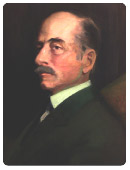Has Wisconsin Produced Any Great Judges?

John B. Winslow
As announced this past summer, Joseph A. Ranney is serving as Marquette Law School’s Schoone Visiting Fellow in Wisconsin Law and using the occasion to write a book examining the role states have played in the evolution of American law, with a focus on the contributions made by Wisconsin. In a series of blog posts this semester, Professor Ranney will offer some Schoone Fellowship Field Notes. This is the first.
What makes a great judge? Who are the great state judges? Thousands of judges have helped build the edifice that is American state law. Only a few have received great acclaim. What are the elements of judicial greatness, and has Wisconsin produced any great judges? Let me consider the matter, excluding any current or recent judges.

